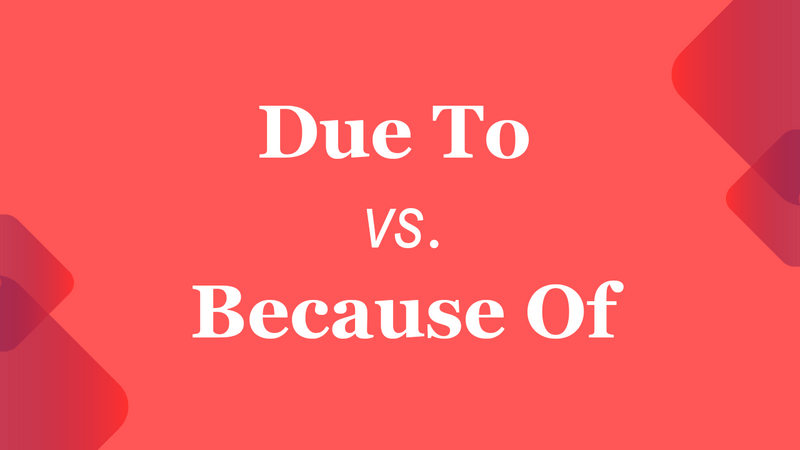Many people, including native English speakers, think that “due to” and “because of” are the same, but they’re not. In this blog post, we’ll explore how we use each one correctly. We’ll break it down using simple words and easy-to-understand examples so that even if you don’t know what an adverbial prepositional phrase is, you’ll grasp the difference between “due to” and “because of.”
The Basics of Because Of and Due To
The basic difference between “because of” and “due to” lies in how they function within a sentence. “Due to” works like an adjective, while “because of” works like an adverb. But what exactly does that mean?
Due To Modifies a Noun
An adjective always describes or modifies a noun. When you use “due to,” you need to have a noun before it. Both “due to” and “because of” are followed by nouns, but the distinction lies in what comes first in the sentence. If the first part of your sentence consists of just a noun, a thing, or an event, then you use “due to.”
Examples:
- The delay is due to the snowstorm.
- The mistake was due to inexperience.
- Her success is due to her intelligence.
In these sentences, “due to” is sandwiched between two nouns. The first noun is “the delay,” “the mistake,” and “her success.” The second noun after “due to” is “the snowstorm,” “inexperience,” and “her intelligence.”
Noun + due to + noun
Because “due to” works like an adjective to modify the first noun, this structure makes sense. The snowstorm describes and modifies the delay. The inexperience modifies the mistake. Her intelligence modifies her success. Nothing is happening in the first half of the sentence. It’s simply describing a thing or a quality.
Because Of Follows an Action
If the first part of the sentence has an action or verb, someone doing something, we use “because of.”
Examples:
- The flight was delayed because of the snowstorm.
- She made a mistake because of her inexperience.
- She succeeded because of her intelligence.
Something happens + because of + noun
In these sentences, actions are taking place. The flight was delayed, she made a mistake, and she succeeded—all actions. That’s why we use “because of” here.
Handy Tricks for Due To vs. Because Of
A quick tip is to substitute “caused by” in the sentence. If it works, you need “due to”; if it doesn’t, you need “because of.”
due to = caused by, resulting from
For example, in the sentence “The delay was due to the snowstorm,” we replace “due to” with “caused by” and we get: “The delay was caused by the snowstorm.” Great, this works! So “due to” is correct.
Whereas in the sentence “The flight was delayed because of the snowstorm,” we replace “because of” with “caused by” and we get: “The flight was delayed caused by the snowstorm.” This doesn’t work, so we stick with “because of.”
Another tip is that whenever you see a form of the verb “to be” (is/was, etc.) and “due to” can fit directly after it, it is always “due to.”
is/was, etc. + due to + noun
For example:
- The cancellation was due to low ticket sales for the event.
Can You Begin a Sentence with Because Of or Due Ro?
You can start a sentence with either “because of” or “due to,” but there is a slight difference in usage between the two.
“Because of” is more commonly used at the beginning of a sentence to introduce a cause-and-effect relationship. For example:
- Because of the rainstorm, the picnic was canceled.
“Due to” is more formal and tends to be used within a sentence rather than at the beginning. However, using it to introduce a cause and effect at the start of a sentence is still grammatically correct. For example:
- Due to the rainstorm, the picnic’s cancellation was.
Recap
- “Due to” works like an adjective. It needs a noun before and after it.
- “Because of” works like an adverb. It explains why something happened and follows a verb or action.
Improve your understanding of “due to” vs. “because of” usage by taking this engaging interactive quiz.

